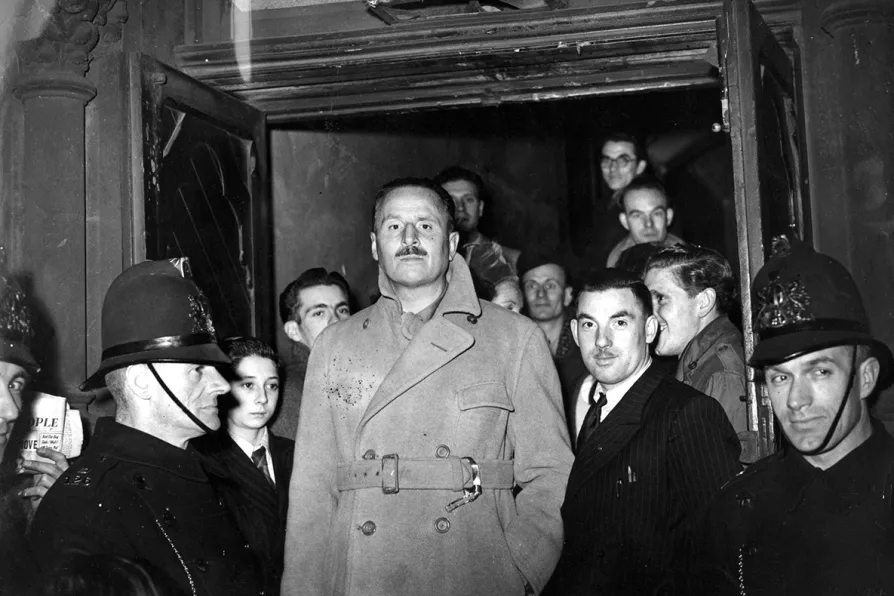The US-Israeli strikes against Iran are part of a decades-long war against the Islamic Republic which has refused to bow to US demands that it surrender its sovereignty, argues VIJAY PRASHAD
GUTO DAVIES commemorates the 89th anniversary of the mass clash where thousands of Rhondda locals and anti-fascist activists made sure ‘not even one Welsh sheep would hear the Mosley message’ and rioted against the BUF rally

 Sir Oswald Mosley, ex leader of the British Union of Fascists, surrounded by police after speaking in public for the first time since the war at the Memorial Hall in Farringdon, November 1947
Sir Oswald Mosley, ex leader of the British Union of Fascists, surrounded by police after speaking in public for the first time since the war at the Memorial Hall in Farringdon, November 1947
TODAY is the anniversary of a significant event that took place in the Rhondda Valley town of Tonypandy back in 1936 — the battle of De Winton Field — which is being commemorated by a public event with a view to honouring the history but also focusing on its significance for the present day.
Tonypandy at the time was a very different place with the coalmining industry still going strong, with seven working pits in the immediate vicinity of the town, providing employment and nurturing a militant trade unionism — but also imposing immense hardship on the local population.
The history of coalmining in the area had been a turbulent one, with the infamous Tonypandy riots of 1910 when the military was sent in to quell the disturbance and through the lean years of the late 1920s and early 1930s, a decade of pit closures, strikes and hunger marches.
Unemployment was at a high level, as was political awareness, with the Communist Party in conjunction with the “Fed” (South Wales Miners’ Federation) playing a prominent role in upholding the cause of the miners, both in and out of work. Tonypandy in 1936 had seven communist councillors, and a year earlier, Harry Pollitt had strongly contested the Rhondda East parliamentary seat.
The British Union of Fascists (BUF) was founded in 1932 by career politician Oswald Mosley, modelling itself on the achievements of Mussolini and Hitler, and subsequently attempted to gain popularity, but was time and again repelled by the local working-class population.
These clashes became known as “battles” in their various locations: the “battle of Stockton” in Stockton-on-Tees on September 10 1933; the “battle of South Street” in Worthing on October 9 1934, the “battle of Holbeck Moor” in Leeds on September 27 1936 and surely the most famous, the “battle of Cable Street” in the East End of London on October 4 1936.
In this context, the battle of De Winton Field was a clash between fascists and various anti-fascist counter demonstrators and was the BUF’s last attempt to gain a foothold in Wales, having previously organised similar events in Swansea, Cardiff and Pontypridd.
On the day of the battle, BUF propaganda officer Tommy Moran and his Blackshirts attempted to stage a rally in a field near Tonypandy town centre. The event had not been publicised, but socialist and anti-fascist groups were alert and poised to respond. An estimated 6,000 people turned out on the day to repel the Blackshirts. The local organisers famously swore that “not even one Welsh sheep will hear the Mosley message.”
The fascists were protected by the police, and the situation escalated into violence with the throwing of fists and stones, after which the large crowd celebrated its success by singing the communist anthem, The Red Flag.
While Moran and his accomplices were escorted out of Tonypandy, 37 locals were arrested, including women, and were to be charged on 137 counts of riot, incitement to riot, unlawful assembly, breach of the peace, and disturbing a public meeting. Several were given six-month prison sentences. Of the 37 summonsed, four would shortly be travelling to Spain to fight in another battle against fascism, defending the cause of the Republican government against Franco’s military coup.
One of those was Harry Dobson, Tonypandy born, a miner, a member of the Fed and Communist Party, who had been sent to study in the Lenin School in Moscow in 1931. Allegedly, upon his release from prison after the battle of De Winton Field, Dobson’s first words were “how do I get to Spain?”
He joined the International Brigades to fight in the Spanish civil war in June 1937, becoming a battalion commissar and being fatally wounded in the fighting at Gandesa on the banks of the River Ebro, dying on August 3 1938.
Tonypandy today bears little resemblance to the thriving mining sprawl of the 1930s. The pits have all closed with no alternative employment offered, leaving a community divorced from its past and struggling to maintain its identity into the future.
Into this vacuum emerges the threat of right-wing populism, with Reform UK gaining a profile and hoping for success in the 2026 Senedd elections. Other more shadowy groups such as the neonazi “Voice of Wales” (staunch supporters of Reform UK) are also on the move — the danger is imminent.
The relevance and the commemoration of the battle of De Winton Field is therefore twofold — to remind the people of the Rhondda Valleys of their radical, indeed revolutionary, recent past, and to focus on the continued fight against a resurgent and antagonistic far-right. By knowing our history, we can fight for our future.
Guto Davies is secretary of the Pontypridd branch of the Communist Party.










